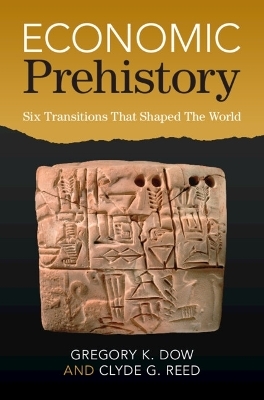
Economic Prehistory
Six Transitions That Shaped The World
Seiten
2023
Cambridge University Press (Verlag)
978-1-108-83990-7 (ISBN)
Cambridge University Press (Verlag)
978-1-108-83990-7 (ISBN)
Uses economic logic and archaeological evidence to explain six crucial transitions in human prehistory: sedentism, agriculture, inequality, warfare, cities, and states. These developments were the foundations for modern global civilization. Includes formal economic models but it is broadly accessible to readers from other social sciences.
Around 15,000 years ago, almost all humans lived in small mobile foraging bands. By about 5,000 years ago, the first city-states had appeared. This radical transformation in human society laid the foundations for the modern world. We use economic logic and archaeological evidence to explain six key elements in this revolution: sedentism, agriculture, inequality, warfare, cities, and states. In our approach the ultimate cause of these events was climate change. We show how shifts in climate interacted with geography to drive technological innovation and population growth. The accumulation of population at especially rich locations led to creation of group property rights over land, stratification into elite and commoner classes, and warfare over land among rival elites. This set the stage for urbanization based on manufacturing or military defense and for elite-controlled states based on taxation. Our closing chapter shows how these developments eventually resulted in contemporary global civilization.
Around 15,000 years ago, almost all humans lived in small mobile foraging bands. By about 5,000 years ago, the first city-states had appeared. This radical transformation in human society laid the foundations for the modern world. We use economic logic and archaeological evidence to explain six key elements in this revolution: sedentism, agriculture, inequality, warfare, cities, and states. In our approach the ultimate cause of these events was climate change. We show how shifts in climate interacted with geography to drive technological innovation and population growth. The accumulation of population at especially rich locations led to creation of group property rights over land, stratification into elite and commoner classes, and warfare over land among rival elites. This set the stage for urbanization based on manufacturing or military defense and for elite-controlled states based on taxation. Our closing chapter shows how these developments eventually resulted in contemporary global civilization.
Gregory K. Dow is Professor of Economics at Simon Fraser University. Clyde G. Reed is Professor Emeritus of Economics at Simon Fraser University.
1. Economics meets Archaeology; 2. A Primer on Malthusian Economics; Part I. Sedentism and Agriculture: 3. The Upper Paleolithic; 4. The transition to Sedentism; 5. The transition to Agriculture; Part II. Inequality and Warfare: 6. The transition to Inequality; 7. Warfare between Egalitarian groups; 8. Warfare between Elite groups; Part III. Cities and States: 9. Mesopotamian city-states: Data and hypotheses; 10. Mesopotamian city-states: A formal model; 11. The emergence of Cities and States.
| Erscheinungsdatum | 10.08.2022 |
|---|---|
| Zusatzinfo | Worked examples or Exercises |
| Verlagsort | Cambridge |
| Sprache | englisch |
| Maße | 160 x 235 mm |
| Gewicht | 990 g |
| Themenwelt | Geschichte ► Teilgebiete der Geschichte ► Wirtschaftsgeschichte |
| Wirtschaft ► Volkswirtschaftslehre | |
| ISBN-10 | 1-108-83990-8 / 1108839908 |
| ISBN-13 | 978-1-108-83990-7 / 9781108839907 |
| Zustand | Neuware |
| Informationen gemäß Produktsicherheitsverordnung (GPSR) | |
| Haben Sie eine Frage zum Produkt? |
Mehr entdecken
aus dem Bereich
aus dem Bereich
wie die USA und China um die technologische Vorherrschaft auf der …
Buch | Hardcover (2023)
Rowohlt (Verlag)
CHF 41,95


